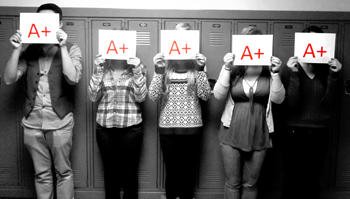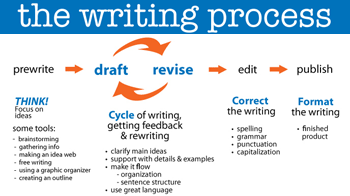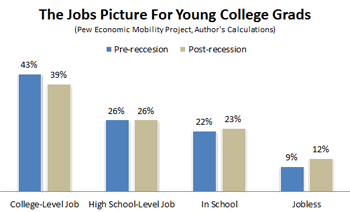What’s Missing in the College Experience? Part 4 of 4
April 16, 2014 Leave a comment
Part 4 of “What’s Missing in the College Experience” – Where is your major leading you?
“Many people end up doing work completely unrelated to their major in college, but it still helps to know for what careers that major might matter when selecting a major or concentration. Students who really know the possible career paths with an undergraduate degree are few and far between at the time of major selection. Many students choose their majors in their sophomore year before they have much work experience at all. There would be many benefits to students if there was a consultant at the school keeping track of where their major may lead, career-wise, and what those careers meant in terms of average activities. Not only would students be making a more informed decision, but it would jump start the process of searching oneself to figure out what they really want to do before the big crunch at the end of senior year.” (Eli Lisseck ’13)
While I was at Mount Holyoke College as the Director of Recruiting and Employer Relations, I had the opportunity or working with many great partner recruiting organizations and some really wonderful students looking to make their mark in the world. One woman, in particular, that really ‘got it’ was a student that was interviewed and hired by, I believe, Paine Webber.
She was a history or psychology major, I can’t remember for sure, but the point being she was hired on by a pre-eminent financial institution after graduation in the liberal arts. Upon being installed on a team, one of her also recently graduated co-workers, had come out of a more formal business program as opposed to her degree in the liberal arts. Upon hearing of her ‘history’ or ‘psych’ major, he turned to her in a meeting and brazenly said, “what are you doing here?” Without missing a beat, she responded by saying, “to do the things you cannot!” A brilliant retort and was coming from someone that could articulate her liberal arts experience and how it would be a good translation to that financial working environment.
But for many, that transition and translation is not so easy. College is a major expense in one’s lifetime but students who don’t follow their hearts by delving into subjects they’re most passionate about will ultimately hurt their chances of a successful—and satisfying—career in the long term, many college officials say.
For college students, declaring a major can be a stressful moment in one’s academic career. What do I major in? What should I choose? Now I have to live with this? These are some of the questions that plague thousands of newly minted college students each year, looking ahead, producing beads of sweat and who have nightmares of doing the ‘diploma walk’ only to head off the stage after graduation directly into an unemployment line.
For many, they view it as though they essentially are to say, ‘this is now what I am to do for life…’ While true to some degree, no pun intended, a major is really nothing more than saying I am specializing in an area of interest and taking the classes to support such. For someone who already has a career destination in mind; say they want to build bridges as an engineer or be a surgeon, they are lucky in that they are on a defined path and their declaration of major is more of a natural means to an end. The more difficult task is when one doesn’t necessarily have a set outcome in mind; no set path or destination, and choosing or declaring a major can be a pretty stressful addition as one feels they are essentially locking in by having to ‘choose their future.’
The good news is that, as stated above, a major is a focus and what, for many, is missing in their college experience, is a real, comprehensive understanding as to how that major is, or can be, translated to the working world and charting off on a career in the future. This is especially true when majoring in the liberal arts or humanities where the outcome can be a much more abstract path as is not necessarily a linear translation to a job or career.
Much of what happens in the classroom, and its success, is in how one, upon graduation, understands the subtlety, nuance and range of skills that are now to be articulated in a way that explains its relevance to a potential employer.
Most majors are elastic in that employers rarely ‘need’ a specific degree majored in, but instead a set of skills (both hard & soft), experiences and the ability to put them into motion. It is rare that a new hire is showing up at the door with a stand-alone skill. Employers look for a mosaic of such and future college graduates have such, but many do not know they have such and it is in this applied learning, this translation that can be the ‘make or break The college experience is too often limited in making that translation for students and many times the only discussion of such is schlepped over to the off-in-the-corner, stand-alone career services to make those connections evident.
This is a huge missed opportunity in that while these dedicated offices of careers and career transition do what they can, without the full ‘eco-system’ buy-in of the campus at large, the talk of transition from academics to career is usually too limited or late in coming and is missing a great opportunity to be as effective as it could be.
Much of what should or could be done during the college experience is a synthesizing of one’s academic studies at every corner of the respective campus, in a way that fully cross-pollinates, so that students have four years of not only academic intake, but four-years of transitional understanding of their academic history, both looking back and looking ahead? The college experience should, and can, be an artful balance of synthesizing interests, skills, personality strengths and acquired knowledge while at the same time acquiring tangible experience outside of the classroom.
In a perfect world, in the first four semesters, when wrapping up the sophomore year, if possible, this synergistic learning would make for a much better understanding of one’s choosing a major and how it ultimately can be a better blueprint for the transition to career and life after college.






Please Share Us!